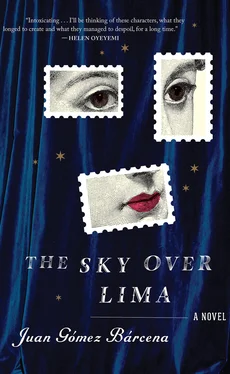“He’s not exactly an expert on the topic, that’s for sure. Indeed, I don’t think he’s all that interested. But you should hear the ideas he has… Incredible ideas, Carlota! You’re going to love them!”
José laughs, even pats him on the knee again. Carlos thinks of the mirror and, with a bit of effort, laughs too. His laugh is discreet, expectant, as if it were full of hollow spaces, as if it were prepared to cease at any moment so José can finally describe the sort of ideas he’s referring to. But he doesn’t.
◊
Madrid, February 17, 1905
My dear friend:
How dreadful your letter, and how I trembled as I read it! The paper still clutched in my hand, I saw you in my mind’s eye as if in a dream, dragged along in that awful tumult you rendered so eloquently. The lack of bread creates savage beasts. And equally savage and heedless was your decision to so expose yourself to danger! Tell me, would imperiling yourself make these letters arrive more quickly or make that terrible strike finish more rapidly? For a moment, before our very eyes, you became a full-blown anarchist. A modern-day Bakunin, with a lump and a bruise as your trophy. A fine bother you’ve given us! For once — though it will not serve as precedent — I must acknowledge that your father is not entirely wrong. Do not give me that look; I agree with him. You are a little girl who must be looked after and chided. Yes, chided! Does that provoke your indignation? But a falling-out and a friendship lost are inevitable when a person insists on risking her life for such a trifling thing as a handful of my letters. Instead, let’s make up and you tell me whether you are still in any pain from that injury you suffered, the thought of which causes me keen anguish! Are you sure you haven’t minimized the seriousness of the incident to protect the nerves of your friend, who is so concerned about your health and life?
Now that my heart has stopped racing, I reread your letter, which despite its horror is also quite beautiful. I pause several times, entranced, on these captivating lines: “From the breakwater they seemed to form a single body, as if they were a monstrous living thing spilling down the docks and wharves, its skin scaly with hats and faces.” Or this one, no less beautiful: “Above the agitated faces, the bodies of the first horsemen came into view. There aloft, they might have been at the bow of a ship that cut through the swell of workers, who shouted and scattered in all directions.” Ah! Do you realize that you, too, are a poet? Even if you do not write slim volumes of verse, there are many other ways to make poetry; one is a poet in the way one looks at things, and you — and I say this with all sincerity — truly have that quality. These letters are poetry! And I, who hope to continue to receive them for a long time to come, must beg of you to promise that you will never embark upon such madness again. Do so for your father, who loves you so much, or even — if you will forgive my boldness — do so for this humble servant who, here on the other side of the Atlantic, anxiously awaits swift news of your recovery and new examples of your poetry…
◊
After that, the novel continues on its course as if it had never stopped. Except that’s not true; the novel continues, but something has changed. For starters, the settings have changed. The chapters are no longer dictated up in the garret; for some time now, they have descended instead to the mundane reality of billiards halls, opium dens, and cabarets. The novel frequents those haunts along with its numerous authors — at this point they’ve added six or seven new pens to the project. First the aforementioned Ventura, and then his gaggle of friends, who provoke brawls wherever they go and have a curious habit of taking the opposite position for anything Carlos says, no matter the topic. One of them, a fellow named Márquez, is less interested in Georgina than he is in the countless billiards games over which they hammer out her biography. And, of course, there is José, who has grown tired of sitting on the sidelines and for the first time is attempting to act as master of ceremonies, to decide what Georgina can and cannot think.
The others agree. They agree and Carlos writes.
The settings change; the authors change. And, of course, Georgina herself changes too. After all, her life is made only of the stuff of words, and naturally the ones uttered in the stillness of a garret are not the same ones that are strung together amid the clamor of the singing cafés and vaudeville theaters, or in the smoky somnolence of a clandestine opium den. In such settings, it is no wonder — indeed, anything else is unimaginable — that Georgina becomes a bit bolder, one might say more in keeping with the sight of the cabaret dancers baring their thighs as the authors drink and write. Often Ventura and his friends offer new ideas while groping the dancers’ hindquarters or playing billiards. They propose phrases and words that the old Georgina would never have uttered. Though these are only minor details, Carlos fears that they contain the seed of something new, and he forcefully objects to the suggestions. Then it is up to Gálvez to decide the matter. He almost always sides with Carlos, but sometimes, smiling, he embraces some of the newcomers’ fancies. These little defeats gnaw at Carlos’s pride and blemish Georgina’s biography. They stand out like scrawls on an unmarred file.
But José himself is unquestionably the most changed of all. For the first time, he has difficulty making decisions; he contemplates them for long periods, nibbling at the cap of his pen. Sometimes it takes him hours to judge whether it is pertinent that Georgina say something or not. He agrees with Carlos that such decisions cannot be made lightly. In the end everything hinges on these words, and if they ever want the poet to dedicate a book to Georgina, they’re going to have to do much better still. And so sometimes, after opting for Ventura’s suggestion, he might still be uneasy. He waits for the others to leave and then he calls Carlos over. See here, Carlota, explain to me again why you say this word isn’t right. And he listens quietly, with an attention and patience he’d never dare display in front of the others.
You know what? he will say when he arrives at the club the following night, before he’s even removed his hat. I’ve thought better of it. We’re going to have to cut that last paragraph.
And once more, Ventura and his friends agree. They agree and Carlos writes.
◊
One afternoon the Rodríguez family receives a visit from the Almadas. Carlos has never heard of them before, but they must be an important family, judging by how vigorously his mother scolded the servants on the eve of the big day. You don’t know them because they’ve been living in Philadelphia, in the United States, for the past twenty years, Don Augusto tells him, as if he cared. And so, because Carlos doesn’t care, he doesn’t bother to listen to the end of the story. He can imagine what it is, anyway: Centuries of grandeur wiped out in a single decade by a failed business, or by debts, or by gambling. Afterward, when all seems lost, a return to the country they once disdained, the only place where their last name still means something. And finally, the girl — because Carlos knows that somewhere in that story there must be a daughter or niece of marrying age, and he also knows that she is the only reason for their visit.
And in fact there is a daughter — or, rather, two daughters. Their names are Elizabeth and Madeleine, and they are presented with a great display of curtsies and polite clichés. Elizabeth is tall, slender, and somewhat pretty, though she is dazzling compared to her sister. Madeleine is fat and clumsy, and her homeliness is indisputable in any context. She has a large mole on her cheek that seems to dominate her entire countenance, and Carlos can’t stop staring at it throughout the introductions. “Our Madeleine was born in Philadelphia and doesn’t speak Spanish all that well yet,” Señor Almada warns, perhaps intrigued by the interest that Carlos is showing in her, “while our dear Elizabeth speaks both languages perfectly. I’m sure you will find her charming company,” he adds, smiling. Carlos tries to smile too, and more or less manages it. “Wonderful,” he says.
Читать дальше












